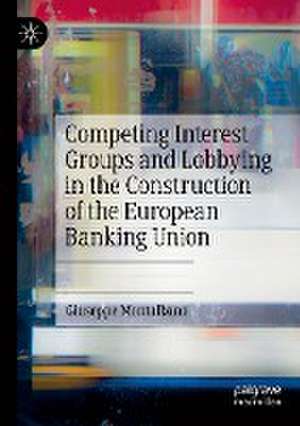Competing Interest Groups and Lobbying in the Construction of the European Banking Union
Autor Giuseppe Montalbanoen Limba Engleză Paperback – 19 feb 2022
| Toate formatele și edițiile | Preț | Express |
|---|---|---|
| Paperback (1) | 698.80 lei 6-8 săpt. | |
| Springer International Publishing – 19 feb 2022 | 698.80 lei 6-8 săpt. | |
| Hardback (1) | 702.73 lei 6-8 săpt. | |
| Springer International Publishing – 18 feb 2021 | 702.73 lei 6-8 săpt. |
Preț: 698.80 lei
Preț vechi: 822.12 lei
-15% Nou
Puncte Express: 1048
Preț estimativ în valută:
133.71€ • 139.61$ • 110.67£
133.71€ • 139.61$ • 110.67£
Carte tipărită la comandă
Livrare economică 04-18 aprilie
Preluare comenzi: 021 569.72.76
Specificații
ISBN-13: 9783030654276
ISBN-10: 3030654273
Ilustrații: XIX, 337 p. 13 illus.
Dimensiuni: 148 x 210 mm
Greutate: 0.47 kg
Ediția:1st ed. 2021
Editura: Springer International Publishing
Colecția Palgrave Macmillan
Locul publicării:Cham, Switzerland
ISBN-10: 3030654273
Ilustrații: XIX, 337 p. 13 illus.
Dimensiuni: 148 x 210 mm
Greutate: 0.47 kg
Ediția:1st ed. 2021
Editura: Springer International Publishing
Colecția Palgrave Macmillan
Locul publicării:Cham, Switzerland
Cuprins
Part I.- 1. Introduction.- 2. A Critical Transnationalist Approach to the European Financial Governance.- 3. The Banking Industry in the Aftermath of the Financial Crisis.- Part II.- 4. The Supranationalization of Banking Supervision in Europe.- 5. The Crisis Management Framework and the Single Resolution Mechanism.- 6. The Unbacked Backstop: The European Deposit Insurance Scheme.- 7. The Reform of the Prudential Framework and the Single Rule Book.- 8. The Forgotten Pillar. On the Rise and Fall of the Banking Structural Reform.- 9. Conclusions.
Notă biografică
Giuseppe Montalbano is a Teaching and Research Assistant in the Department of Political Science at LUISS Guido Carli Free International University, Italy
Textul de pe ultima copertă
This book investigates the role of banking interest groups and lobbying in the making of the European Banking Union. Facing the politicization of financial regulation in the wake of the crisis, core players of the European banking industry managed to adapt and re-orient their lobbying resources and strategies to influence the reform process. This work advances an original Critical IPE approach, which combines structural power, the collective agency of key socio-economic groups and the issue salience as critical determinants to explain corporate influence in policy-making. The explanatory framework is applied to a comprehensive analysis, tracing the Banking Union’s development within the broader context of the EU post-crisis banking regulation. An in-depth scrutiny of the interest groups’ preferences, coalitions and attainments is thus provided on the pillars of the Banking Union, covering banking supervision, resolution, deposit insurance, as well as the reform of the banks’ prudential requirements and the failed project of an EU banking structural reform.
Giuseppe Montalbano is a Teaching and Research Assistant in the Department of Political Science at LUISS Guido Carli Free International University, Italy
Giuseppe Montalbano is a Teaching and Research Assistant in the Department of Political Science at LUISS Guido Carli Free International University, Italy
Caracteristici
Systematically and comprehensively examines the influence of the financial industry on post-crisis EU banking reforms. Introduces a three-level analytical framework to link structural power, coalition-making capabilities, and the political salience of policies. Includes 40 interviews carried out with European Commission officials, MEPs and lobbyists involved in the policy-making process.
